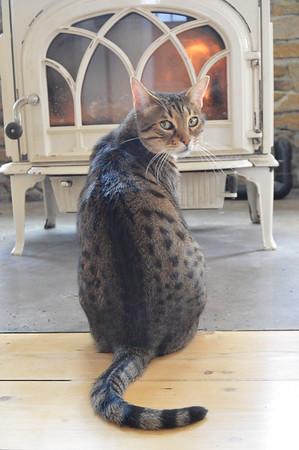Here's an article that TCS members might find interesting: Cats rival dogs on many tests of social smarts. Bug is anyone brave enough to study them?
The article describes what researchers are learning about cat intelligence and behavior now that those studies are finally taking place. There's a lot more known about the behavior and intelligence of dogs, in part because they are easier to study, so cat research has a ways to go to catch up. But it's happening and results are confirming what a lot of us already know. Our cats are geniuses. Well, okay, I'm making that last part up but the studies do reveal much more about cat intelligence than previously known.
Well, okay, I'm making that last part up but the studies do reveal much more about cat intelligence than previously known.
An example of cat intelligence: they pass the point test, something chimpanzees can't do but toddlers and dogs can. When researchers pointed to one of two overturned bowls, their feline test subject checked out the bowl indicated.
The article has four experiments you can do at home with your own cat(s) to answer the following questions:
1. Does your cat know their name?
2. Is your cat tuned into your emotions?
3. How independent is your cat?
4. Does your cat prefer you? Or food?
When it comes to Paul, I prefer not to know the answer to that last question!
The article describes what researchers are learning about cat intelligence and behavior now that those studies are finally taking place. There's a lot more known about the behavior and intelligence of dogs, in part because they are easier to study, so cat research has a ways to go to catch up. But it's happening and results are confirming what a lot of us already know. Our cats are geniuses.
 Well, okay, I'm making that last part up but the studies do reveal much more about cat intelligence than previously known.
Well, okay, I'm making that last part up but the studies do reveal much more about cat intelligence than previously known. An example of cat intelligence: they pass the point test, something chimpanzees can't do but toddlers and dogs can. When researchers pointed to one of two overturned bowls, their feline test subject checked out the bowl indicated.
The article has four experiments you can do at home with your own cat(s) to answer the following questions:
1. Does your cat know their name?
2. Is your cat tuned into your emotions?
3. How independent is your cat?
4. Does your cat prefer you? Or food?
When it comes to Paul, I prefer not to know the answer to that last question!










 . We are their slaves!
. We are their slaves!



